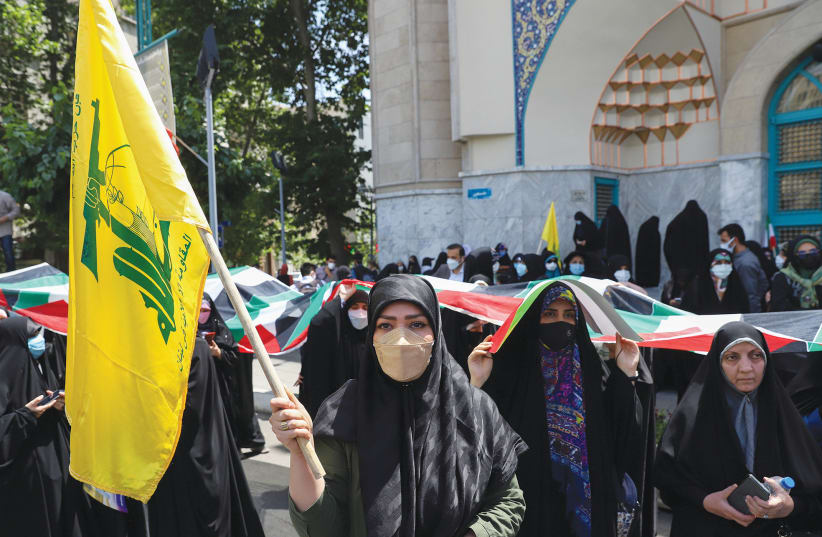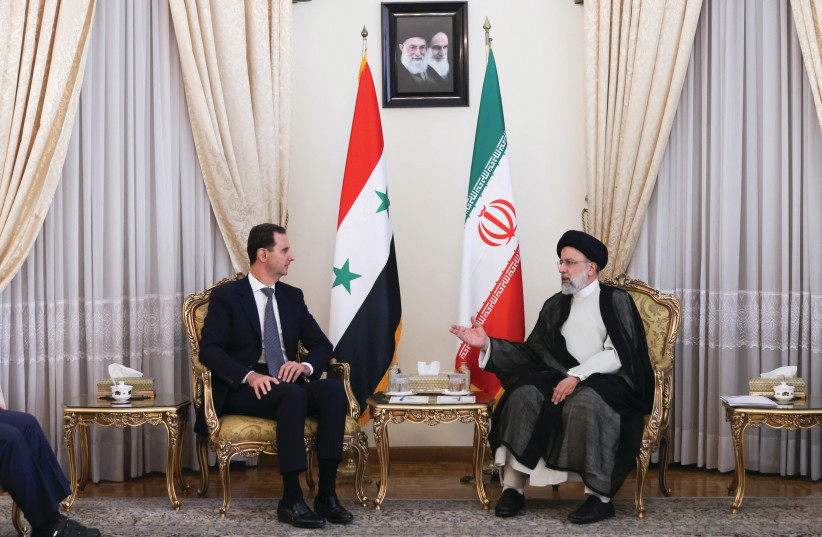As negotiations between Iran and the West continue over Iran’s accelerating nuclear program, opponents of the deal have voiced their concern over the huge financial relief Iran stands to gain in return for limited concessions. Although sanction relief for Iran would indeed be necessary in order to finalize a nuclear agreement with Iran, this sanction relief is a double-edged sword and should be carefully considered based on the specific costs and rewards of any future agreement.
Any sanction relief Iran experiences in return for reducing its nuclear program will allow it to strengthen its proxy organizations and deepen its nefarious networks across the globe. The most notable of these networks are well known and exist in and around Israel. Iran is estimated to provide $700 million (NIS 238 m.) annually to Hezbollah in Lebanon, and $100 million (NIS 340 m.) annually to terror groups in Gaza. In Syria, Iranian military support is thought to total between $20-$30 billion dollars (NIS 68 b.-NIS 102 b.).
In Iraq, Iran continues to support large Shia militias; and in Yemen, Iran provides the Houthis with tens of millions of dollars, including advanced arms transfers, such as ballistic missiles, ATGMS and drone technology. In all, Iran spends billions of dollars annually through military and financial support to its network of proxy organizations in the Middle East.
While Iran’s networks in the Middle East receive a lion’s share of attention and analysis, Iran’s activities in Africa receive less of the spotlight. Africa is an incredibly strategic continent to Iran for a few reasons. With a population of 1.1 billion people, Sub-Saharan Africa provides Iran with a huge market for Iranian goods.
Additionally, the horn of Africa region is strategically important to Iran’s ambitions on the Arabian Peninsula, given it’s its proximity to Yemen and the Bab al-Mandab strait. Iranian networks in Somalia help facilitate illegal arms shipments to the Houthis in Yemen. Iran has also allegedly provided support to the Al-Qaeda aligned Al-Shabaab terrorist organization, which maintains significant power across Somalia.
Importantly, Africa provides Iran with easier access to soft targets and an ideal operating environment to carry out covert operations against its adversaries. Eight months after Soleimani was killed by a United States drone strike, news broke that the Iranian embassy in Pretoria was involved in a potential plot to assassinate the US diplomat to South Africa, Lana Marks.
Arguably, this plot was in retaliation for Soleimani’s death. The fact that Iran chose South Africa as an ideal location to carry out a retaliatory strike should raise red flags over how deep Iran’s networks in Africa currently are.
THE FAILED plot in South Africa is not the only evidence of hostile Iranian operations on the continent. In 2013 Nigerian Secret service uncovered an Iranian cell in the country attempting to carry out attacks against US and Israeli targets. In 2018 Morocco severed ties with Iran over their support for the Polisario front in Western Sahara. In November 2021, an Iranian was arrested in Kenya planning terrorist attacks against Israeli targets.
This arrest was in addition to two other Iranians arrested in Kenya in 2012 under similar terrorism charges. In February 2021, 15 people were arrested in East Africa and linked to an Iranian plot to attack the Embassies in the region, including UAE, Israel, and the US. Iranian networks have been exposed across the entire continent including in Africa in CAR, Chad, Sudan, Kenya, Somalia, Nigeria, Niger, Eritrea, Gambia, Sudan, South Sudan and South Africa.
Iranian networks, such as those in Africa and the Middle East, will likely expand further if Iran’s cash-strapped government finalizes a nuclear agreement with the West.
Herein lies the difficulty of the current nuclear negotiations. On the one hand the Iranian Regime remains incredibly close to shifting from the enrichment of Uranium to the development of a nuclear weapon. A nuclearized Iran would be impossible to contain, risk the collapse of nuclear non-proliferation in the Middle East, and threaten the stability of the entire region.
On the other hand, the last thing the US, Israel and the world at large wants is an empowered Iran with less restrictions and greater financial capital. Currently, Iran’s economy is in bad shape. Recent protests over loss of food subsidies have spread across the country, and prompted calls for a change in leadership and end to the Islamic Republic.
Iran is not in a position to continue to manage the exorbitant costs associated with propping up its proxy organizations and clandestine networks around the world. If Iran were to suddenly receive billions of dollars in sanction relief, it would be far easier to increase its support to proxy organizations, some of whom are directly responsible for continued attacks against the US and its regional allies.
There is no clear path forward and no easy way to put Iran back in the box. In attempting to solve one issue, the West may very well exacerbate the other. Every possible path comes with heavy costs and an uncertain future.
Supporters and opponents of sanction relief for Iran both have the same end goal: a pacified Iran and a stable Middle East. In this regard, both sides would do well to weigh the pros and cons carefully before any irreversible decisions are made.
The writer is the legislative fellow at the Endowment for Middle East Truth (EMET), based in Washington.

